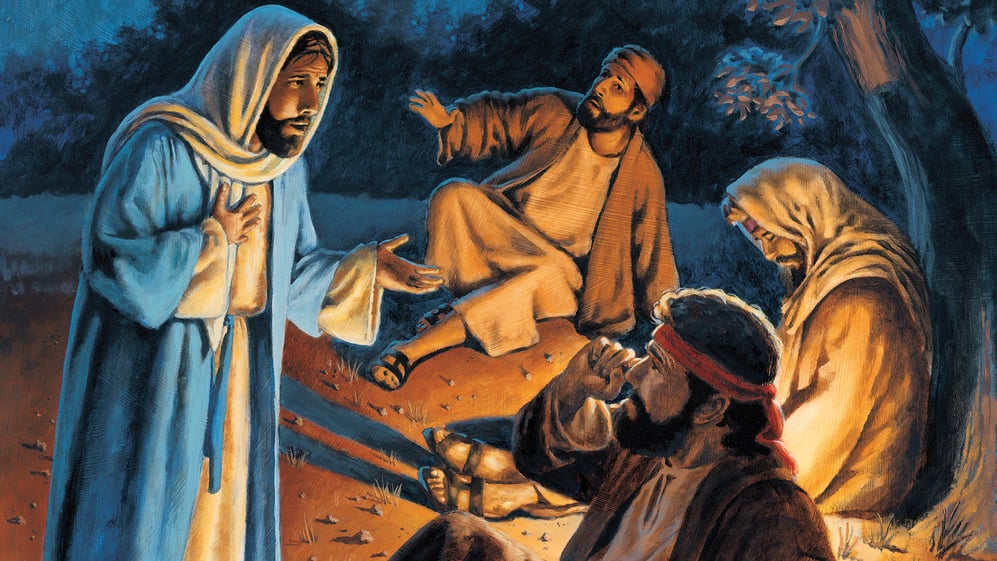This month we spend time with John, my personal favorite. On first inspection, John is the ideal apostle. Along with Peter and James, he formed Jesus’ inner circle, who were present for some of the most important events in Jesus’ ministry. He also wrote a large portion of the New Testament and served as Mary’s adoptive son per Jesus’ mandate at the cross. Nevertheless, John had his faults, including a wrathful heart and conceit.
Key Verses
Matthew 17:1–3
And after six days Jesus took with Him Peter and James, and John his brother, and led them up a high mountain by themselves. And He was transfigured before them, and His face shone like the sun, and His clothes became white as light. And behold, there appeared to them Moses and Elijah, talking with Him.
Mark 14:32–34
And they went to a place called Gethsemane. And He said to His disciples, “Sit here while I pray.” And He took with Him Peter and James and John, and began to be greatly distressed and troubled. And He said to them, “My soul is very sorrowful, even to death. Remain here and watch.”
Mark 10:35–37
And James and John, the sons of Zebedee, came up to Him and said to Him, “Teacher, we want You to do for us whatever we ask of You.” And He said to them, “What do you want Me to do for you?” And they said to Him, “Grant us to sit, one at Your right hand and one at Your left, in Your glory.”
Luke 9:53–55
But the people did not receive Him, because His face was set toward Jerusalem. And when His disciples James and John saw it, they said, “Lord, do You want us to tell fire to come down from heaven and consume them?” But He turned and rebuked them.
John 19:26–27
When Jesus saw His mother and the disciple whom He loved standing nearby, He said to His mother, “Woman, behold, your son!” Then He said to the disciple, “Behold, your mother!” And from that hour the disciple took her to his own home.
What do we know about John?
- He was a fisherman (Mark 1:19; Luke 5:10).
- He was one of the first called to be a disciple (Luke 5:11).
- He was a beloved disciple (John 13:23).
- He and his brother, James, were called the Sons of Thunder (Mark 3:17).
- He lived a long life, in comparison to the other apostles. (He received and wrote down the Book of Revelation roughly sixty years after Jesus’ ascension.)
- He took Mary, the mother of our Lord, into his home following Christ’s death (John 19:26–27).
- He was one of Jesus’ inner circle, one of the few present for the healing of Jairus’s daughter, the transfiguration, and praying in the Garden of Gethsemane.
- He was exiled to the island of Patmos (Revelation 1:9).
- He asked our Lord to call down fire on those who would not receive Him (Luke 9:51–56).
John was ready to deal out the Lord’s wrath.
While on the way to Jerusalem, Jesus and His disciples encounter Samaritans. They “did not receive Him,” according to Luke 9:53. This is not surprising as Samaritans and Jews did not mix because of historical feuds over ethnicity and religious differences.
Perturbed at the scornful Samaritans, John asks the Lord’s permission to call down fire from heaven to consume them. John’s request reflects a heart full of sinful (albeit well-intentioned) wrath. It is ironic. On one hand, John trusts that in Christ he can draw such power from heaven; on the other, his vengeful heart bears no resemblance to that of Jesus.
John’s attitude and request offers an excellent opportunity for discussion regarding sin, justice, and revenge. Such a dialogue is likely better suited for adolescents but could be simplified for children. Consider the following starters.
- Is God angry when we sin?
- Does God punish people when they sin? Is so, how?
- Since Jesus died on the cross, does God still get angry or punish us for sin?
- If someone injures me or takes my money, should they have to pay for what they have done?
- When should we involve the police/law?
- What is the difference between justice and vengeance?
- What sort of vengeance do we leave for God?
- God says that we must forgive those who sin against us, no matter what. How does this square with justice in this world?
John (and his brother, James) make a request.
During Jesus’ ministry, John and James ask Jesus to grant them to sit on His right and left when He would come in glory. The other disciples are indignant, and rightly so. In an act of love—likely unappreciated by the brothers—Jesus does not grant their wish, instead protecting them from its cost. It is clear enough that Christians ought to refrain from boasting. Often, though, we are taught—or “catch”—the false idea that pride is always sinful. Here again, reflect on John’s behavior with the following starters.
- What do you think of John and James’s request?
- Why were the other disciples upset?
- Is it wrong to feel good about yourself when you accomplish something or have success?
- What is the difference between pride and arrogance?
James and John wanted to make themselves greater according to their own idea of greatness and glory. In Jesus’ response to John and James in this moment, we see that Jesus shows them that people who lead in the kingdom of God put the needs of others ahead of their own. What John and James do not understand is that Jesus’ ultimate glory comes through dying on the cross and his resurrection from the dead. In this, Jesus gives us the ultimate glory—eternal life with Him. He now invites us to join in this life of service above self.
Learn more ways to teach the apostles to your students.












